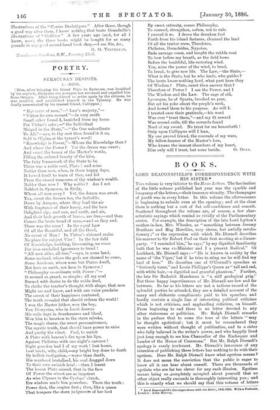POETRY.
SYRACUSAN DESPOTS.
I.—DION.
[Dion, after bringing his friend Plato to Syracuse, was banished by his nephew, Dionysius the younger, but returned and expelled him from Ortygia. After being forced to retire again by the citizens, he was recalled, and established himself in the Tyranny. He was finally assassinated by his trusted friend, Callippus.] "EQUALITY of men,"—" Law's majesty,"— " Virtue its own reward "—in very sooth Small other found I, banished from my home For Virtue's sake ;—" the Individual Merged in the State,"—" the One subordinate To All,"—aye, to thy cost thou found'st it so,
Sold in (Egina at the tyrant's word!
"Knowledge is Power,"—Whose the Knowledge then ?
And whose the Power ? Yet the dream was sweet; And sweet the honey of the Master's words, Filling the ordered beauty of the hive, The fairy framework of the State to be.
Thine was a noble soul, Plato ! and mine Nobler than now, when, in those happy days, It bowed itself to learn of thee, and fed From the stored treasures of thy wisdom's wealth.
Nobler than now ? Why nobler ? Am I not Noblest in Syracuse, in Sicily, Whom all men envy ? Yet, the dream was sweet.
Yea, sweet the flowers too, the daffodils, Down by Anapus, where they load the air With fragrance of their honey, and the bees Delighted sip ; and sun, and earth, and air, And their lush growth of leaves, are free,—and then Comes the brute tread of man,—and so they end.
There was the error ! In the equal Law Of all the Beautiful, and all the Good, No count of Man ! In Virtue's visioned realm No place for subject Vice ! In the fair field Of Knowledge, budding, blossoming, no room For iron-sandalled Ignorance to tread !
"All men alike, all free,"—aye, in some land, Some no-land, where the gods are shamed to come, Some Academe, where none bat Platos dwell, Not here on earth, not here in Syracuse ! "Philosophy co-ordinate with Power :"- It seemed so grand, so simple; all my soul Burned with desire to do the noble deed, To clothe the teacher's thought with shape, that men Might see and know, and with one voice proclaim The secret of their happiness confessed, The truth revealed that should redeem the world!
I won the Master hither, won the boy, You Dionysins, who in Locri drowns His exile days in drunkenness and blood, Won him to hearken to the stern rebuke, The magic charm, the sweet persuasiveness, The mystic truth, that should have power to raise And purify the vilest. Fool, to match A Plato with heaven's fire upon his lips, Against Philistus with one night's carouse !
Right guerdou had I of my work ! lost home, Lost lands, wife, child,—my bright boy done to death By hellish instigation,—worse than death, His manhood brutalised, his soul dragged down To their own swinish level :—then I learnt The lesson Plato missed, that in the face Of Power the wisest are as impotent As wise Ulysses in the Cyclops' clutch, Ere wisdom made him powerless. There the truth : Power first, the sceptre first ; then, like a queen That tempers the stern judgments of her lord By sweet entreaty, comes Philosophy, To counsel, strengthen, soften, not to rule.
I proved it so. I drove the drunken fool Forth from his island fastness, cleansed the land Of all the traitor crew, Theodotes, Philistns, Heracleides, Nypsius, Bade carnage cease, and taught the rabble rout To bow before my breath, as the field bows Before the healthful, life-restoring wind.
Yea, mine the power of the wind, to bend,
To break, to give new life. The Law,—the State,—
What is the State, but he who leads, who guides The brute know-nothing herd, what part have they Of Wisdom ? Plato, canst thou answer that ?
Therefore of Power ? I am the Power, and I The Wisdom and the Law. The sage of old, Lycurgus, he of Sparta, brooked no peer, But set his yoke about the people's neck, And bowed them to his purpose. As will I.
I trusted once their gratitude,—his word Was ever "trust them,"—and my fit reward Was second exile, till the cowards found Need of my sword. No trust for me henceforth !
Only upon Callippns will I lean,
My one proved friend, the comrade of my wars, My fellow-learner of the Master's lore, Who knows the inmost chambers of my heart, Him only will I trust, but none beside. 0. OGLE.


































 Previous page
Previous page